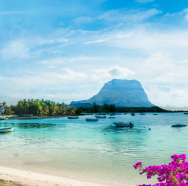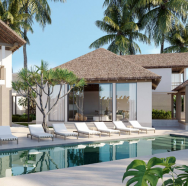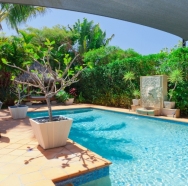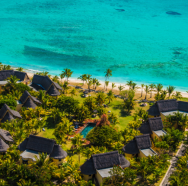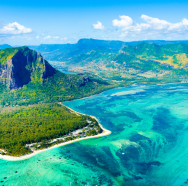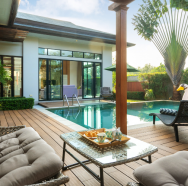Immigrating to Mauritius: the expatriation guide
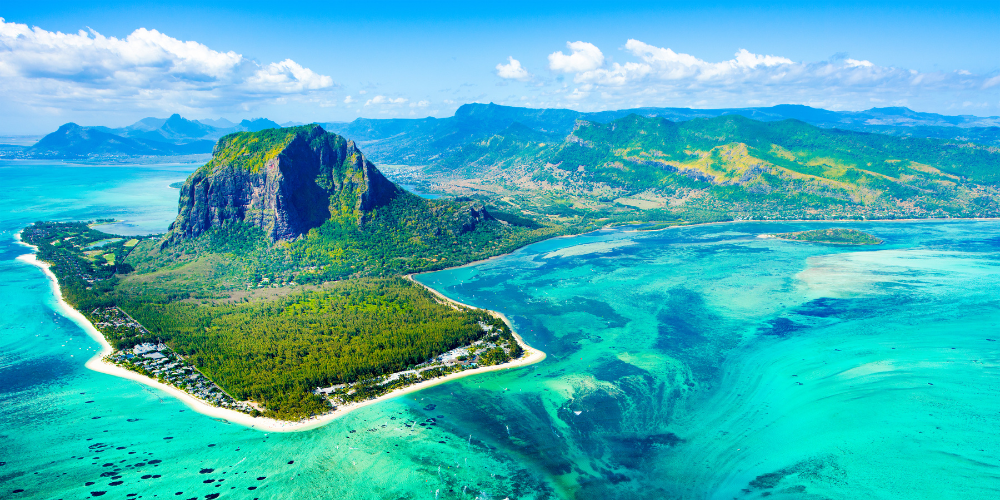
Mauritius, with its idyllic beaches and tropical climate, is much more than just a holiday destination; it's a true paradise for those looking to start a new life under sunny latitudes. Tempted by expatriation? You're not alone. Every year, thousands of people choose to settle in Mauritius, attracted by the promise of exceptional quality of life and significant tax benefits.
But beyond the pleasant climate and postcard beaches, what makes Mauritius such a popular choice among expatriation destinations? And most importantly, how to navigate the administrative formalities and integrate into a rich and diverse culture without losing your footing? This article is your step-by-step guide to making Mauritius your new home, with all the practical advice and essential information to ease your transition.
1. Why choose Mauritius to expatriate?
Why is Mauritius so popular among expatriates? Far from being just a tropical cliché, Mauritius is a true melting pot of cultures, a growing economy, and a haven for those seeking a higher quality of life without breaking the bank. Here are some reasons that might convince you to pack your bags.
An exceptional living environment
Imagine living where others come for vacation. The climate is mild almost all year round, and the landscapes are breathtaking, ranging from sandy beaches lined with palm trees to lush mountains. Wondering if everyday life can really be that relaxing? In Mauritius, the answer is yes. Life is paced by a tranquility you'd be hard-pressed to find elsewhere.
Attractive tax benefits
Mauritius offers an advantageous tax system for expatriates, including relatively low fixed-rate taxation and no inheritance tax on locally acquired assets. Why is this important? Because it can represent a significant saving, especially if you plan to work or invest in your new homeland.
A cultural melting pot
The island is a crucible of cultures, a mosaic where African, Indian, European, and Chinese influences blend harmoniously. This diversity is reflected in the local cuisine, festivals, and daily life. Looking for an authentically cosmopolitan experience? Mauritius delivers it on a silver platter.
A stable and growing economy
Unlike some other popular destinations, Mauritius enjoys a stable economy with a well-developed service sector, including high-quality financial services and tourism. This attracts not only those looking to invest but also those wishing to start new businesses in a favorable regulatory environment.
Each of these reasons makes Mauritius not only an idyllic place to relax but also a fertile ground for professional and personal opportunities. Thinking of taking the plunge? Stay with us to discover how to navigate the administrative and legal intricacies of expatriation to Mauritius.
2. Understanding the legal formalities
Navigating legal formalities can often seem intimidating, can't it? In Mauritius, understanding the legal and administrative framework is essential for a hassle-free expatriation. Here's an overview of the essential steps for legally settling on this paradisiacal island.
Choosing the right type of visa
Depending on your situation — whether you come for work, to invest, or simply to enjoy retirement — the necessary type of visa varies. A tourist visa is not enough if you plan to settle permanently. You will likely need to opt for a residence permit, accessible either through investment, employment, or by purchasing a qualified property in schemes approved by the Mauritian government.
Mauritius offers various types of visas to meet the specific needs of expatriates, whether they come for work, retirement, or simply to enjoy life on the island over a longer period. Here's an overview of the main options and conditions for obtaining them:
Retirement Visa: this visa is intended for individuals aged 50 or over who wish to spend their retirement in Mauritius. Applicants must prove that they can transfer a minimum amount of 1,500 USD (or the equivalent in another currency) per month into a Mauritian bank account to support themselves.
Permanent Residence: permanent residence can be obtained through various programs, including investing in real estate or creating a business that generates substantial turnover. Investors must, for example, invest a minimum of 375,000 USD in a qualified project under the Property Development Scheme (PDS).
Premium Visa: recently launched, the premium visa allows foreigners to live in Mauritius for a period of up to one year, renewable. This visa is particularly aimed at digital nomads or those who wish to stay long on the island without entering the local job market. It requires proving sufficient income from foreign sources to live in Mauritius.
Work Visa: to obtain a work visa in Mauritius, you generally need an offer of employment from a local company. The employer must demonstrate that the position cannot be filled by a Mauritian citizen and must obtain a work permit for the foreign employee. This visa is tied to the duration of the employment contract.
Residence application procedure
The application can be quite straightforward if you have all your documents in order. You'll need to prove your investment or employment, as well as provide proof of your financial means for you and your family. Once your application is submitted, processing can take from a few weeks to a few months, so patience is often the order of the day.
3. The real estate market in Mauritius
The real estate market in Mauritius is as diverse as the island itself, offering a range of possibilities for expatriates wishing to settle permanently. Whether you're looking to buy or rent, here's what you need to know to navigate the Mauritian real estate market with confidence.
Buying a property
Mauritius has opened its real estate market to foreigners through specific programs such as the Property Development Scheme (PDS), which not only allows the purchase of real estate by non-residents but also offers opportunities for permanent residence under certain conditions. Interested? It's crucial to understand that these properties can represent a significant investment, but they are also synonymous with quality and luxury, often located in highly desirable areas.
The purchase process
Buying a property in Mauritius is no more complicated than in other countries, provided you strictly follow the legal steps. This includes registering with the EDB (Economic Development Board) for purchases in approved schemes. A tip: always proceed with due diligence with the help of a recognized real estate agent and a notary to secure your transaction.
Renting a property
If you prefer to rent before deciding to buy, you will find a wide choice of properties to rent, from modern apartments in the city to beachfront villas. Leases are generally flexible, but it is wise to understand the terms of the contract to avoid any surprises. Renting can be an excellent way to explore different areas of the island before making a definitive purchase choice.
Practical tips
Whether you buy or rent, do not neglect the importance of location. Some neighborhoods are more sought after for their proximity to international schools, business centers, or beaches. Also, consider access to services such as hospitals, shopping centers, and transport.
Investing in real estate in Mauritius can be a rewarding and lucrative experience, provided you prepare your project well. Can you already see yourself sipping a cocktail on your terrace with an ocean view? This could become a reality sooner than you think. Stay with us to discover how to integrate and make the most of Mauritian life.
4. Cultural integration
Settling in a new country is an adventure, and integrating into the local culture is a crucial step to really feeling at home. In Mauritius, where cultural diversity is celebrated, understanding and immersing yourself in the social fabric can be both exciting and enriching. Here are some tips to help you integrate smoothly.
Appreciate and respect local customs
Mauritians are known for their hospitality, but also for their attachment to traditions. Whether it's the celebrations of Diwali, Chinese New Year, or the Maha Shivaratree festival, each event is an opportunity to better understand the different communities and to forge links. Why not participate or even help organize these festivities? It's an excellent way to show your respect and your willingness to be part of the community.
Language and communication
Although English and French are widely spoken, learning Mauritian Creole, the vernacular language, can be a great asset to break the ice and make friends. You may initially feel lost in translation, but your efforts to learn a few basic phrases will certainly be appreciated.
Participate in local life
Get involved in community activities. Whether it's joining a sports club, participating in volunteer groups, or regularly visiting local markets, each interaction is an open door to new encounters and enriching experiences.
Networking and establishing professional contacts
Do not underestimate the importance of networking. Attending professional events, conferences, or meet-ups can open doors and facilitate your professional integration on the island. This is especially true in Mauritius, where the business environment is dynamic but also very interconnected.
Integrating into Mauritian culture is a journey in itself, full of discoveries and learnings. By showing yourself to be open and respectful, you'll find that the island has much more to offer than just its picturesque landscapes and pleasant climate. Are you ready to embark on this beautiful adventure? Stay tuned for more tips on daily life in Mauritius.
5. The healthcare system in Mauritius
Accessing quality healthcare is a major concern for anyone considering expatriation. In Mauritius, the healthcare system is well structured, offering both high-level public and private services. Here's what you need to know to navigate the Mauritian healthcare system with confidence.
Quality of care in Mauritius
The healthcare sector in Mauritius is robust, with hospitals and clinics equipped with the latest technologies. Whether you need a simple check-up or a more complex procedure, you can be reassured about the quality of care available. But then, how to choose between public and private? Public hospitals offer free or very low-cost care for residents, while private facilities provide faster services and additional amenities, often chosen by expatriates for their comfort.
Health insurance
It is strongly advised to have health insurance that covers both routine care and emergencies. Many expatriates opt for international insurances that offer extensive coverage, which can be reassuring far from one's home country. Wondering where to find the best deals? Comparing offers online or talking to an insurance broker can be an excellent start.
Access to medications
In Mauritius, pharmacies are well stocked, and it is generally easy to obtain prescribed medications. However, if you are on a specific treatment, it is prudent to check the availability of your medications on the island or consider bringing a sufficient stock during your move.
The Mauritian healthcare system is ready to welcome you with quality services that ensure peace of mind. Whether you need a minor procedure or require ongoing care, Mauritius is equipped to meet your health needs. With proper preparation, your health will be in good hands, allowing you to fully enjoy your new life under the tropics.
6. Education and schooling options
If you're moving to Mauritius with children, or planning to start a family on the island, understanding the educational system is crucial. Fortunately, Mauritius offers a range of high-quality educational options that can meet the expectations of both local and expatriate families. Here's an overview to help you navigate the schooling options in Mauritius.
Educational system in Mauritius
The Mauritian educational system is largely inspired by the British model, with public and private schools offering programs up to the secondary level, followed by advanced qualifications such as the Cambridge International A-Level. But what about the quality? Schools in Mauritius are generally well equipped and enjoy a good reputation, especially in the major cities.
International schools
If you prefer an international education for your children, you'll be pleased to know that Mauritius has several international schools offering British, French, and even American curriculums. These schools attract a large number of expatriates and often offer enriching cultural exchange programs and various extracurricular activities. Where are they located? Mainly in urban areas like Port Louis and in neighborhoods popular with expatriates.
Registration and tuition fees
Tuition fees vary significantly depending on the school and the level of education. So, how to budget for these costs? It's important to visit schools, talk with other parents, and consider all options before making a decision. Also, check if scholarships or financial aid are available, which could help ease the financial burden.
Preparation for enrollment
To enroll your children in a Mauritian school, you will need documents such as birth certificates, previous school reports, and proof of vaccination. Is it complicated? Not necessarily, but it is advisable to start the process well before your arrival to secure a place in the chosen establishment.
With a bit of preparation and research, you can find an educational solution that will perfectly suit your children and help them adapt to their new life in Mauritius. It's not just about finding the right school; it's about giving your children the tools to succeed and thrive in a multicultural environment. Ready to take the plunge? Stay tuned to discover even more about daily life and leisure in Mauritius.
7. Daily life and leisure
Living in Mauritius is much more than enjoying its beautiful beaches and sunny climate. Daily life here offers a rich palette of activities, developed infrastructure, and a vibrant culture that are sure to captivate you. Let's take a look at what you can expect on a day-to-day basis on this fascinating island.
Transport and mobility
Getting around in Mauritius is relatively simple thanks to a well-organized transport network. Options include public buses, taxis, and car rental services. For those who prefer total independence, buying or renting a car can be an excellent decision. The roads are well maintained, but be aware, driving here is on the left! Can it take time to get used to? Perhaps, but it's a small adjustment compared to the freedom to explore the island at your own pace.
Leisure and entertainment
Whether you enjoy relaxing on the beach, hiking in the mountains, or visiting museums and historical sites, Mauritius has something to offer everyone. The island is also famous for its world-class golf courses and exceptional diving spots. Don't miss the local markets for an immersion in Mauritian culture, where you can taste exotic fruits and discover local crafts.
Social and community life
The island boasts a dynamic and welcoming expatriate community. Participating in group activities, whether in sports, culture, or volunteering, is an excellent way to meet people and form connections. Why not join a club or association? It can be a gateway to successful and fulfilling integration.
Clubs and associations for expatriates
Many clubs and associations are available to help newcomers adjust to their new environment. These organizations often offer valuable resources, practical advice, and networking opportunities that can be invaluable when far from home. They are also an excellent way to stay connected with your culture while embracing the new.
Living in Mauritius means embracing a lifestyle where daily exoticism and enriching encounters are the norm. Ready to explore and enjoy every moment? Mauritius welcomes you with open arms, with a kaleidoscope of activities and experiences that promise to enrich your life. .
Acheter un bien immobilier à Maurice : guide complet pour les étrangers
Toutes les étapes, conseils et démarches pour investir et acheter un bien immobilier à l'île Maurice en tant qu'étranger.
Lire la suiteComment investir dans l'immobilier de luxe à Maurice ?
Découvrez comment investir dans l'immobilier de luxe à Maurice avec notre guide complet. Marché, cadres légaux et stratégies
Lire la suiteImmobilier à Maurice : comment trouver le bien idéal ?
Découvrez comment trouver le bien immobilier idéal à l'Île Maurice dans notre guide complet. Emplacement, budget, démarches administratives...
Lire la suite10 raisons d'investir dans l'immobilier à Maurice
Découvrez les 10 raisons clés pour lesquelles investir dans l'immobilier à Maurice est une opportunité en or.
Lire la suiteInvestir dans l'immobilier locatif à Maurice : les meilleurs endroits et stratégies
Discover the best locations and strategies to maximize your returns and benefit from the dynamism of the Mauritian market.
Lire la suiteObtenir un permis de résidence mauricien par l'investissement immobilier
Obtenez votre permis de résidence mauricien en investissant dans l'immobilier ! Découvrez les démarches à suivre.
Lire la suiteAcheter un bien immobilier à Maurice : quel budget minimum ?
Découvrez tout ce que vous devez savoir sur le budget pour l'achat d'un bien immobilier à Maurice en tant qu'étranger ou résident.
Lire la suiteImmigrer à Maurice : le guide de l’expatriation
Découvrez comment immigrer à Maurice grâce à notre guide complet de l'expatriation. Explorez les types de visas, le marché immobilier, l'intégration.
Lire la suiteConvention fiscale France-Maurice : quels avantages pour les contribuables français ?
Découvrez les avantages fiscaux exceptionnels de la convention fiscale France-Maurice pour les investisseurs français.
Lire la suiteMaurice : nouvelle destination prisée par les nomades digitaux
Découvrez pourquoi Maurice devient une destination de choix pour les nomades digitaux grâce au visa premium et à ses infrastructures
Lire la suiteL'immobilier dans l'Ouest de Maurice
Le marché immobilier de l'Ouest de Maurice et les opportunités d'investissement à Flic-en-Flac, Tamarin et Rivière Noire
Lire la suiteLes frais et taxes associés à l'achat d'un bien immobilier à Maurice
Découvrez tous les frais et taxes associés à l'achat d'un bien immobilier à Maurice.
Lire la suiteInvestir dans l'immobilier à Flic en Flac
Investissez à Flic en Flac : opportunités immobilières, conseils et tendances. Découvrez les meilleurs investissements locatifs.
Lire la suiteGérer son bien immobilier à distance : solutions et conseils pratiques
Explorez des solutions efficaces pour gérer votre bien immobilier à Maurice à distance, et optimiser sécurité et rentabilité
Lire la suiteTop 10 des raisons d'investir dans l'immobilier à Flic en Flac
Découvrez pourquoi investir dans l'immobilier à Flic en Flac, Maurice, est une excellente décision : stabilité, retour sur investissement, qualité de
Lire la suite5 conseils pour réussir votre investissement immobilier à Maurice
Découvrez nos 5 conseils essentiels pour réussir votre investissement immobilier à Maurice, incluant choix de l'emplacement et optimisation fiscale
Lire la suiteFaut-il faire appel à un notaire pour acheter un bien immobilier à Maurice ?
Découvrez pourquoi consulter un notaire pour l'achat immobilier à Maurice est essentiel pour la sécurité et la légalité
Lire la suiteConseils pour bien négocier le prix d'un bien immobilier à Maurice
Les meilleures stratégies pour négocier le prix d'un bien immobilier à Maurice. Conseils pratiques et aperçu du marché.
Lire la suiteMaurice : un havre de paix pour les retraités étrangers
Découvrez pourquoi Maurice est le choix idéal pour une retraite paisible. Immobilier, coût de vie, sécurité et qualité de vie
Lire la suiteL'impact du tourisme sur le marché immobilier à Flic en Flac
Découvrez comment le tourisme influence le marché immobilier à Flic en Flac, idéal pour investisseurs et acheteurs étrangers
Lire la suiteQuartiers en vogue à Flic en Flac pour les acheteurs immobiliers
Découvrez les quartiers en vogue à Flic en Flac, idéaux pour l'achat immobilier. Opportunités pour investisseurs et acheteurs étrangers
Lire la suiteLe marché de l'immobilier de luxe à Flic en Flac
Découvrez les opportunités du marché de l'immobilier de luxe à Flic en Flac, un choix prisé par les investisseurs mauriciens et internationaux.
Lire la suiteAcheter un bien immobilier à l’île Maurice : quelle structure juridique choisir ?
Découvrez les meilleures structures juridiques pour acheter une propriété à l'Île Maurice, adaptées aux résidents et non-résidents.
Lire la suiteLe marché immobilier mauricien en 2024 : analyse et perspectives
Les tendances du marché immobilier mauricien en 2024, les opportunités pour investisseurs et les conseils pour acheter à Maurice
Lire la suiteRéaliser une plus-value immobilière à Maurice : les meilleures stratégies
Découvrez les meilleures stratégies pour réaliser une plus-value immobilière à Maurice. Investissez intelligemment et optimisez votre rentabilité.
Lire la suiteFlic en Flac pour les familles : écoles, services et communauté
Découvrez pourquoi Flic en Flac à Maurice est idéal pour les familles : écoles, services et vie communautaire enrichissante.
Lire la suiteInvestir dans l’immobilier à l’Ile Maurice pour sa retraite
Explorez les avantages d'investir dans l'immobilier à l'Ile Maurice pour votre retraite : qualité de vie, régime fiscal favorable
Lire la suite5 avantages du régime fiscal attractif de l’ile Maurice
Les avantages du régime fiscal de Maurice pour l'achat de propriété. Investissement sécurisé et bénéfices fiscaux attractifs
Lire la suiteFaut-il faire appel à un notaire pour acheter un bien immobilier à Maurice ?
Pourquoi consulter un notaire est essentiel pour acheter une propriété à Maurice, pour locaux et étrangers
Lire la suiteLes programmes immobiliers pour expatriés à Maurice : IRS, RES, PDS et R+2
DescriptionDécouvrez les programmes immobiliers IRS, RES, PDS et R+2 à Maurice pour expatriés. Investissez dans l'immobilier de luxe avec des avantage
Lire la suite